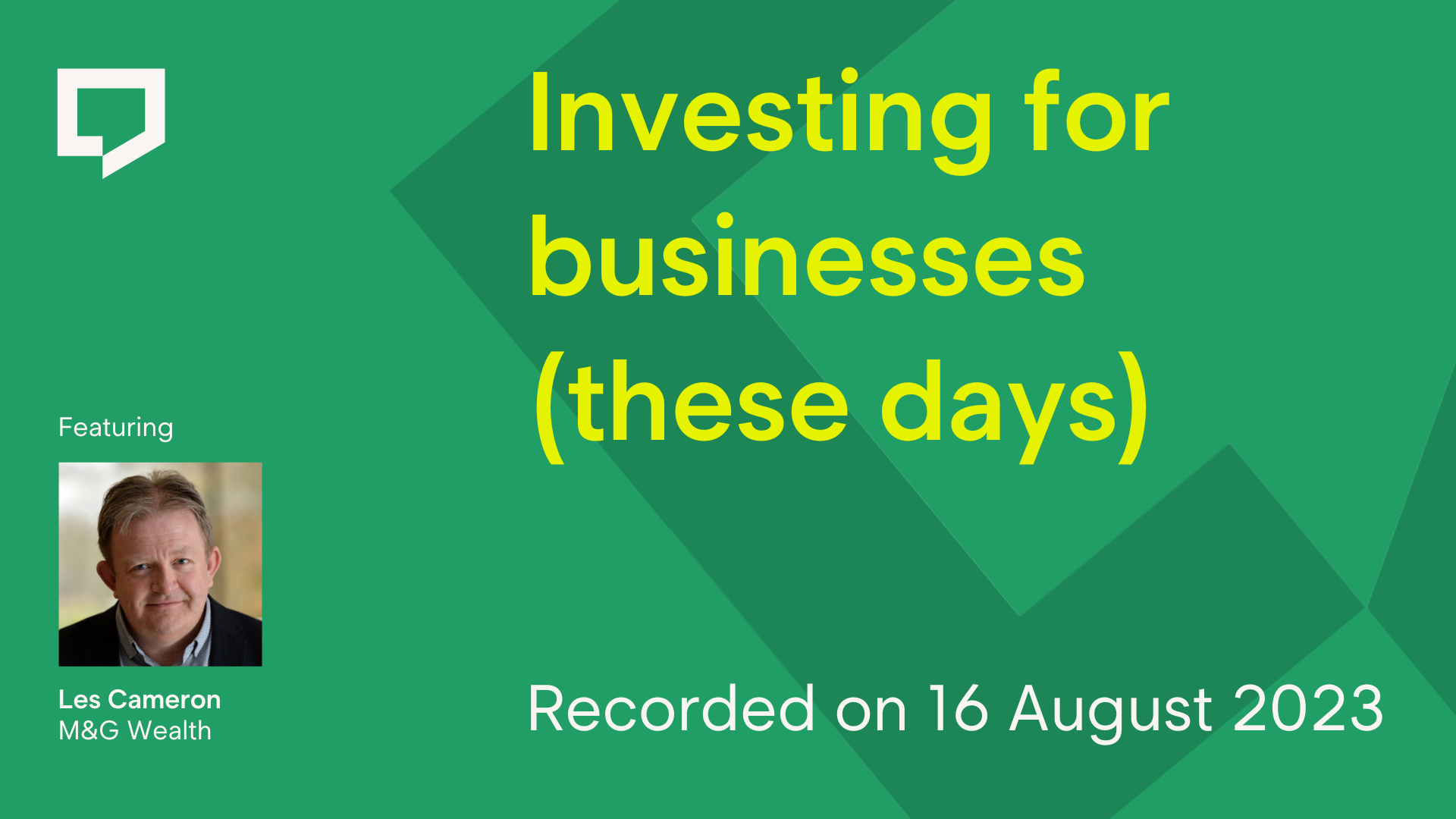
Popular Assembly regular, Les Cameron of M&G Wealth, joined us in something of a follow-up to last November’s online Assembly on financial planning essentials for small businesses.
As you’ll know if you tuned into that Assembly, there are already plenty of reasons for business-owning clients to consider investing surplus profits rather than, for instance, taking them as income.
But April’s 6p rise in corporation tax could add impetus to business owners interest in weighing up their options.
Yet there’s so much uncertainty around these days – even about once relatively dependable vehicles like bonds – so what strategies should you be considering for clients with businesses?
During this lunch-hour online Assembly, Les explored investment options, discuss tax treatments and tackle the topic of demonstrating suitability.
So if you have clients with businesses – or run a business yourself – why not tune in?
We recently teamed up with friend of the Assembly, Steve Sayer of Utmost International, to record a three-part series of special Assemblies. Each one-hour session explores the issues affecting tax and tax planning, and offers practical ideas that paraplanners can consider for their firms’ clients.
In the first part of the series, Steve looked back at the last two budgets – the ‘mini-budget’ in September 2022 and spring Budget in March 2023 – to demonstrate the cumulative effect of ‘stealth’ tax rises and explore strategies to alleviate their effects.
In the second episode, he explored the flexibility of loan trusts and their potential for inheritance tax planning – especially in the wake of the freezes in nil rate and residence nil rate bands announced by the Chancellor of the Exchequer earlier this year.
In the final part of the trilogy, Steve considers discounted gift trusts as an alternative to loan trusts for inheritance tax planning.
In sharp contrast to loan trusts, the decision to execute a gift trust brings no flexibility but their appeal is the immediate inheritance tax advantages.
Whether they’re the right vehicle will depend on a number of planning considerations such as the ages of the applicants and the types of gift trust.
During his talk, Steve looks at the difference between absolute trusts and discretionary trusts, touches on issues like the consequences of pre-2006 flexible power of appointment arrangements, making gifts and insurance policies.
In the slides that you can download below, you’ll find two case studies:
Case study No 1: explores the issues a couple might consider when choosing between a joint settlor or single settlor discounted gift trust.
Case study No 2: a client who wants to invest in a discounted gift trust but wants to be able to secure a fixed level of withdrawals. By combining discretionary and absolute trusts they’re able to achieve their objective without exceeding their nil rate band.
Steve’s talk is ideal if you’re handling cases where clients are weighing up planning opportunities for inheritance tax, this is the special Assembly for you.
We’ve ‘chapterised’ the video above so you can navigate the video however you’d like – and provided the slide number/s too for easy reference.
To download a PDF version of Steve’s slidedeck, just tap the link below. You can also download a CPD certificate as a record of viewing the recording, and links to other resources mentioned during the recording.
CPD, downloads and links
Slides: Discounted gift trusts (opens a PDF in a new browser tab)
We recently teamed up with friend of the Assembly, Steve Sayer of Utmost International, to record a three-part series of special Assemblies. Each one-hour session explores the issues affecting tax and tax planning, and offers practical ideas that paraplanners can consider for their firms’ clients.
In the first part of the series, Steve looked back at the last two budgets – the ‘mini-budget’ in September 2022 and spring Budget in March 2023 – to demonstrate the cumulative effect of ‘stealth’ tax rises and explore strategies to alleviate their effects.
In this episode, Steve explores the potential for loan trusts to feature in inheritance tax planning – especially in the wake of the freezes in nil rate and residence nil rate bands announced by the Chancellor of the Exchequer earlier this year.
Perhaps typecast as a bit of a ‘slow burn’ option in the past, Steve reveals the surprising flexibility that loan trusts offer clients. For instance, offering the ability to begin inheritance tax planning but not cutting off access to cash.
While the inheritance tax advantages of a loan trust may not be so significant initially, the growth of the funds outside the estate over time can accumulate to a substantial amount, providing future planning flexibility.
If you’re handling cases where clients are weighing up planning opportunities for inheritance tax, this is the special Assembly for you.
We’ve ‘chapterised’ the video above so you can navigate the video however you’d like – and provided the slide number/s too for easy reference.
To download a PDF version of Steve’s slidedeck, just tap the link below. You can also download a CPD certificate as a record of viewing the recording, and links to other resources mentioned during the recording.
CPD, downloads and links
Slides: Planning with loan trusts (opens a PDF in a new browser tab)
We recently teamed up with friend of the Assembly, Steve Sayer of Utmost Wealth International, to record a three-part series of special Assemblies. Each one-hour session explores the issues affecting tax and tax planning, and offers practical ideas that paraplanners can consider for their firms’ clients.
In the first part of the series, Steve takes a look back at the last two budgets – the ‘mini-budget’ in September 2022 and Spring Budget in March 2023 – to demonstrate the cumulative effect of ‘stealth’ tax rises and explore strategies to alleviate their effects.
During the hour-long talk he deals with changes in income tax, capital gains tax, corporation tax, and inheritance tax.
Just hit play (above) to watch here or watch it on Vimeo. Alternatively, you can listen to Steve because his talk is also the latest episode of our podcast.
We’ve ‘chapterised’ the video above so you can navigate the video however you’d like – and provided the slide number/s too for easy reference.
To download a PDF version of Steve’s slidedeck, just tap the link below. You can also download a CPD certificate as a record of viewing the recording, and links to other resources mentioned during the recording.
CPD, downloads and links
Slides: Post-April 2023 personal tax changes (opens a PDF in a new browser tab)
Top slicing relief: planning strategies – online Assembly, 16 November 2022 »
Talking top slicing relief – online Assembly, 29 June 2022 »
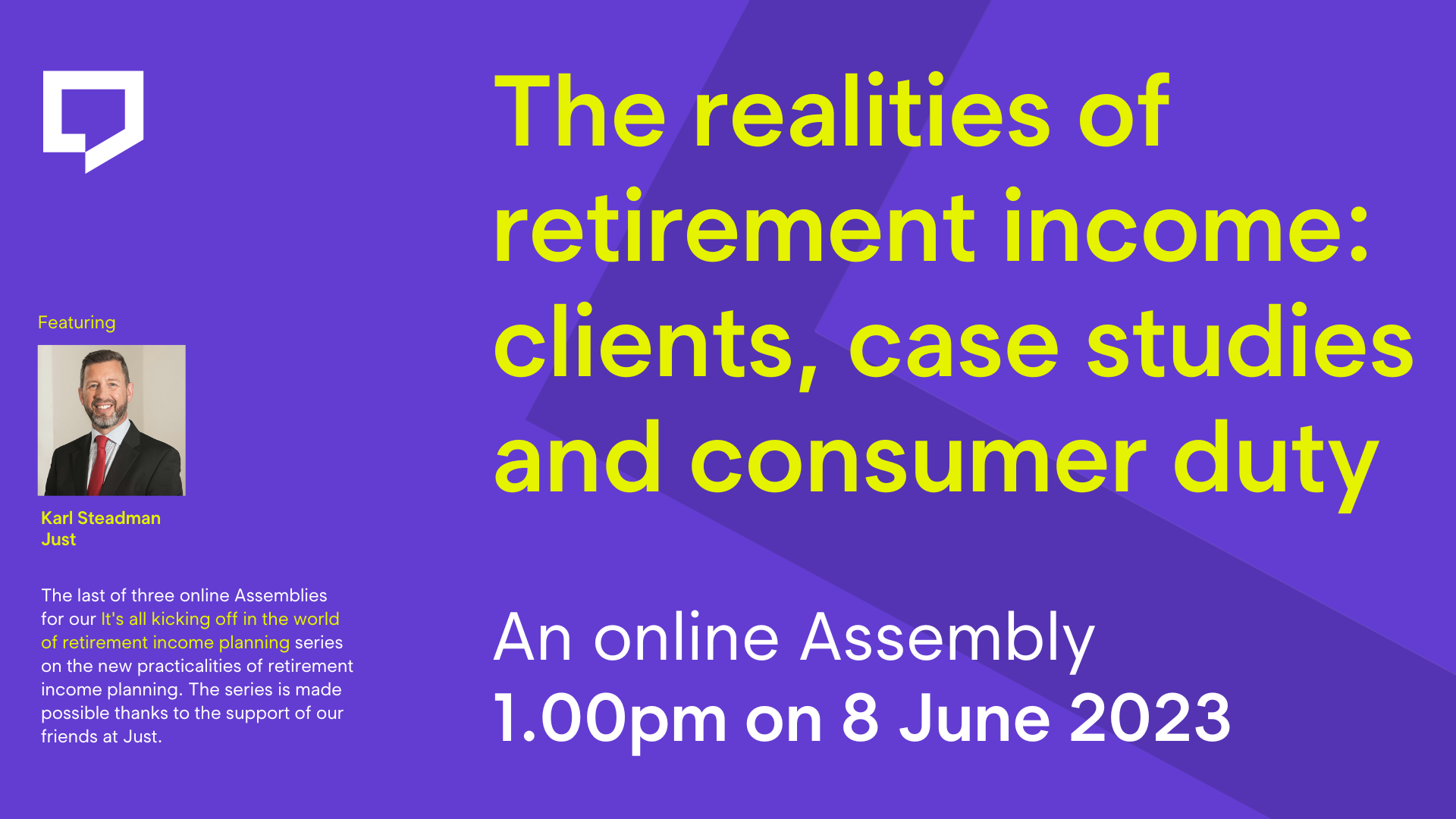
This was the third in our three-part series of It’s all kicking off in the world of retirement income planning Assemblies exploring the new practicalities of retirement income planning – a series made possible with the support of our friends at Just.
In the first Assembly, we looked back at the events that changed the world of retirement income and what the consequences of this change means for paraplanners, advisers and clients.
In our second, we considered the practicalities of researching, creating and executing a plan for clients.
In the third and final part of the series, we explored three case studies – each allowing us to consider the suitability of different strategies to meet the ambitions for retirement income of each client. To help, we were joined by Karl Steadman from Just.
Naturally, we also considered how the Consumer Duty affects the choices available too.
CPD and resources
Scroll down to see links to resources mentioned during the event plus a video replay and podcast episode link.
You’ll also see that we’ve published a link to a CPD survey. Once you complete the survey, a CPD record of your attendance will be emailed to you automatically.
Catch up with parts one and two
If you missed the first two Assemblies in the series, pop over to the Why is it all kicking off in the world of retirement income planning? (Part 1) and Getting real: the new practicalities of retirement income planning (Part 2) where you’ll find a video replay and podcast episode link plus links mentioned during the event.

Join us online at 1pm on 1 June 2023 for the second in our series of It’s all kicking off in the world of retirement income planning Assemblies exploring the new practicalities of retirement income planning – a series made possible with the support of our friends at Just.
In our first Assembly, we asked why it’s all kicking off in the world of retirement income and considered events that have prompted paraplanners to consider an expanding range of strategies to help clients achieve their retirement income goals.
In this Assembly we’ll be getting real by digging into the paraplanning practicalities. During the lunch hour session we expect to cover:
- what the research says
- using forecasting software to consider annuities and secure lifetime income
- looking at modelling examples
- what it all means for assets under management and client risk profiles
- how it works on a platform
To help, we’ll be joined by guests Jean-Paul Grenade and Karl Steadman from Just.
CPD and resources
Following this Assembly we’ll publish links to resources mentioned during the event on this page plus a video replay and podcast episode link,
We’ll also publish a link to a survey. Once you complete the survey, a CPD record of your attendance will be emailed to you automatically.
Book the final session in the series now
In the third and final part of the series – you can book your spot here now – we’ll be gathering online at 1pm on 8 June 2023 to explore three case studies. Each case will allow us to consider the suitability of different strategies to meet the ambitions for retirement income of each client. Naturally, we’ll be considering how the Consumer Duty affects the choices available too.
Watch part one
If you missed the first Assembly in the series, pop over to the event page – visit Why is it all kicking off in the world of retirement income planning? – where you’ll find a video replay and podcast episode link plus links mentioned during the event.

Years of stability in the retirement income planning world changed abruptly on 23 September 2022 when former Chancellor of the Exchequer, Kwasi Kwarteng, presented his ‘mini budget’.
Ever since, uncertainty about rising interest rates, anxieties about inflation, and even worries over the stability of pension funds themselves, have led paraplanners to rethink how clients can achieve the outcome they want from their financial plan.
One consequence of all this? Secure lifetime income has become a thing. And annuities are back in fashion.
What’s more, the demands of the consumer duty means more and more firms are kicking the tyres of their centralised retirement propositions to test suitability – or are setting one up for the first time.
In other words IT’S ALL KICKING OFF IN THE WORLD OF RETIREMENT INCOME PLANNING. And in the eye of the storm (because it does feel a bit like that doesn’t it?) there are paraplanners.
So how are we supposed to make sense of it all? What do we need to know? And what should we be doing about it? (And – while we’re talking about it – how DOES an annuity work?)
It’s all kicking off in the world of retirement: a series of online Assemblies with Just
Working with our friends at Just, we’re hosting a series of three online Assemblies to help you understand where we are, how we got here and – by combining case studies and practical tips – give you the knowledge you need to navigate what’s ahead.
1pm on 25 May 2023: Why is it all kicking off in the world of retirement?
In this first session in the series, we were joined by Karl Steadman from Just to explore what’s changed in the world of retirement income planning and what it means to paraplanners. During the Assembly we covered:
- what’s happened in the economy and markets
- why things won’t be the same again
- what it all means
- income stability and sustainability
- what is an annuity
- assessing attitude to risk
Save your spot at the second and third Assemblies in this series
The second Assembly in this series – ‘Getting real: the new practicalities of retirement income planning’ – is taking place at 1pm on 1 June. For more info and to save your spot now visit the event page now.
Join us online for the third and final Assembly – called ‘The realities of retirement income: clients, case studies and consumer duty’ – which starts at 1pm on 8 June. Grab your spot and get more info here.
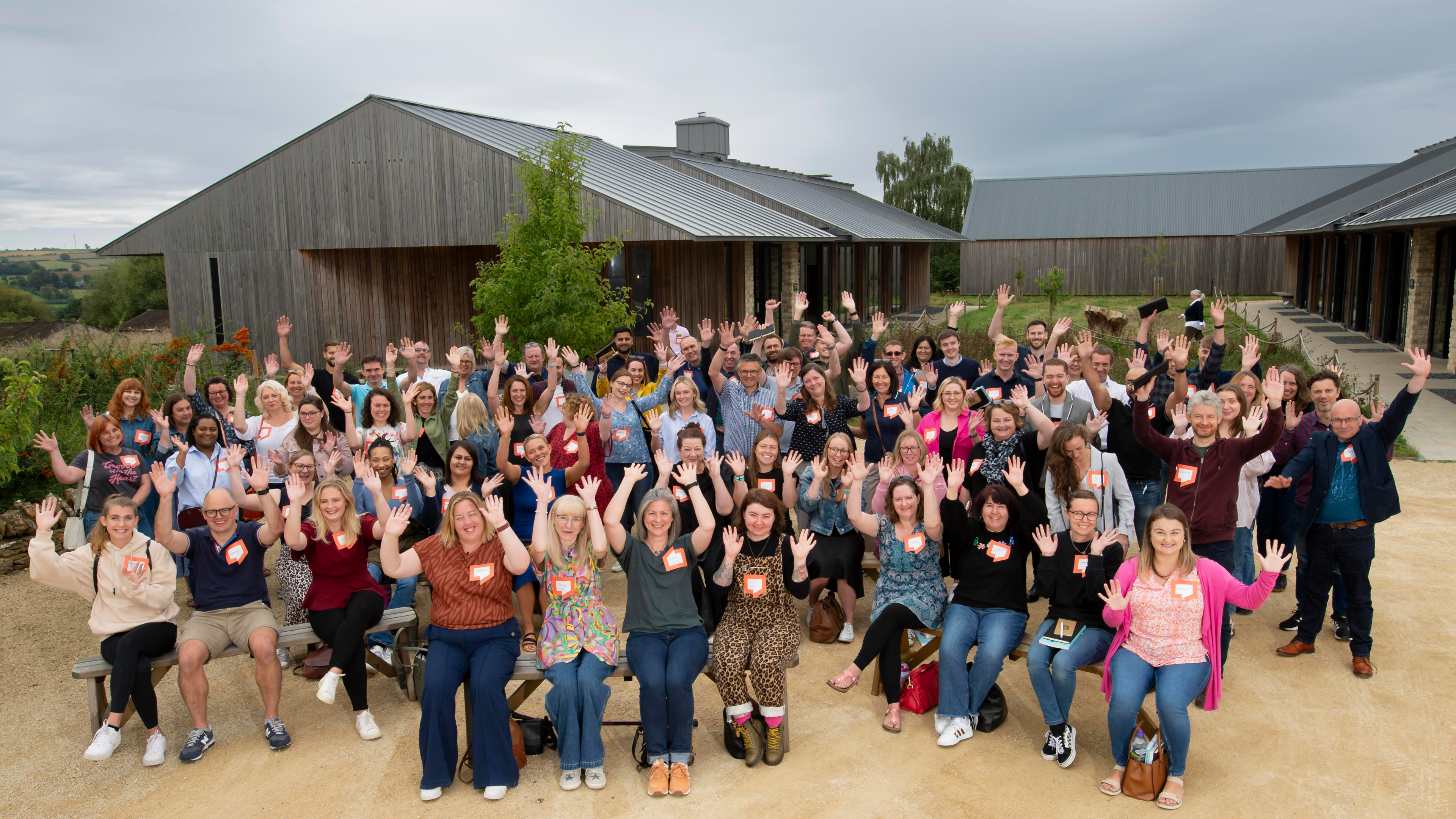
Paraplanners from all over the country gathered for The Big Day Out 2023 on 14th September 2023.
For the second successive year, our destination was the fantastic FarmED – right in the heart of the Cotswold countryside.
(Trust us, it’s lovely.)
This year, The Big Day Out was split into two halves:
1st half: All about paraplanning today
2nd half: All about paraplanning tomorrow

Three groups
Following The Big Welcome, we split the Assembly into three groups – Barley, Oats, and Wheat.
Each group had paraplanning hosts. Hosts volunteered to make sure you were where you needed to be when you needed to be there and to help facilitate conversations.
(The Big Day Out wouldn’t have been possible without our volunteers, so please gave a big hand 👏 to this year’s hosts: Kez Condy, Becky Jones, Jackie Manning, Sian Davies Cole, Pippa Oldfield, Jo Parkes, and Colin Stewart.)
First half: Paraplanning today – Crop Rotations
Each group spent 45 minutes in each of the following three sessions.
Technical top tips
Expert: Les Cameron, Head of Technical, M&G Wealth
This was a chance to quiz a popular Assembly regular in person with those burning technical questions that you’ve always wanted someone to answer.
Suitability reports: a fair value assessment
Leader: Caroline Stuart, Founder of Sparrow Paraplanning
Caroline invited groups to consider whether suitability reports were still fit for purpose and they’ve for a Consumer Duty world.
Were our planning assumptions still fit for purpose?
Leader: Dan Atkinson, Head of Technical, Paradigm Norton
Is it time to re-assess your planning assumptions? Could you really rely on what had happened in the past to plan for the future? This was a chance for participants to test the assumptions that apply to the ‘planning’ part of a paraplanners job title. To help, we were joined by three experts: Thomas Hogg of Timeline, Parmenion’s Jasper Thornton-Boelman and Jon Palin from Barnett Waddingham.

Lunchtime drop-in: Outsourced Paraplanners Banter + Chat x Paraplanners’ Assembly
Lunchtime drop-in: Outsourced Paraplanners Banter + Chat x Paraplanners’ Assembly
Christina Georgiou and Andy Schleider hosted a drop in for participants who are starting out as an outsourced paraplanner, thinking about it, or already are. The session was an IRL version of the ‘Outsourced Paraplanners banter + chat group’ hosted by Andy on WhatsApp.
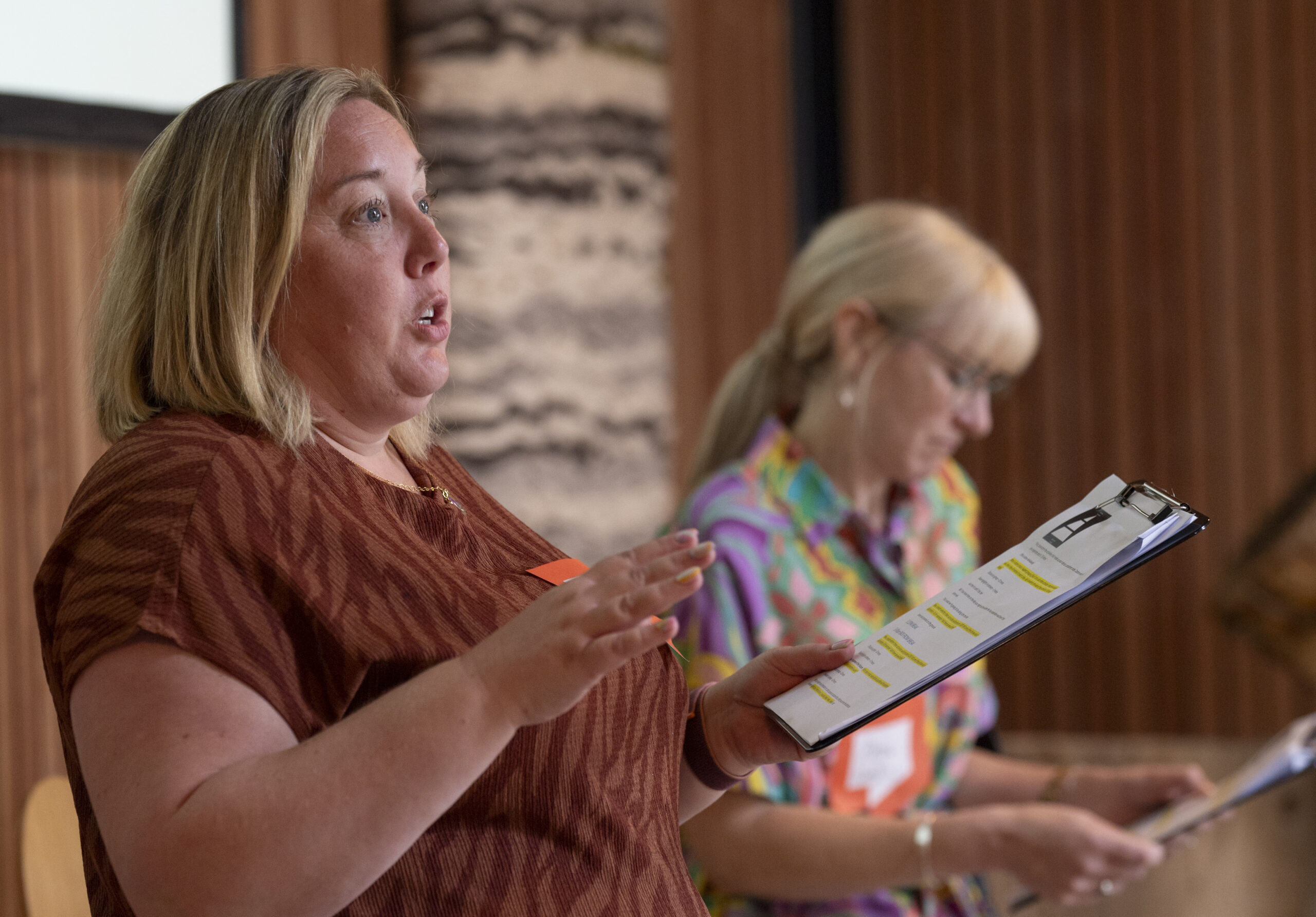

The Afternoon: Paraplanning tomorrow
After lunch, we got right back to the roots of the Paraplanners’ Assembly.
Back in 2013, our first gathering proved that when paraplanners get together to learn, fix and share, we’re able to tackle the biggest issues.
A decade ago, we wanted the financial planning world to recognise paraplanning as a choice of professional career. (And just look at us now!)
Today, the big questions seem to revolve around the future of paraplanning itself and our role in it.
What does artificial intelligence and automation mean for paraplanning and for us? Are remote working and hybrid teams really here to stay? What skills and knowledge are paraplanners going to need for a fulfilling career from now on?
Learn, fix and share
When we began to think about how to tackle these questions, it crossed our minds to invite a keynote speaker to put the world to rights for us.
But we soon realized that that speaker didn’t exist.
Because the future of work was not just about technology. It wasn’t just about personal development and technical knowledge. It wasn’t just about teams and leadership. It wasn’t just about the future of business.
It was too big a job for one person. But a bunch of people? Perhaps even an assembly?
And so we decided that the best people to consider the future of paraplanning were…paraplanners!
Let’s get started
Assembly hosts, Sam Tonks and Sarah Lees, kicked off the afternoon’s session.
We worked with foresight and innovation expert, Eleanor Winton, to help us design three very interactive sessions.
Eleanor recorded two video contributions that we showed to spark your thinking.
But the future of paraplanning? That conversation was up to us.
We knew from the surveys you completed that this kind of thing had been on your minds for a while. And we thought the Assembly was the perfect space for paraplanners to explore it. But you only got out what you were willing to put in, so you were ready to share your thoughts!
We were sure you were going to really enjoy it. We were sure you were going to feel good about having the chance to talk about the future. And we were certain it would be the start of a conversation that – thanks to your participation – our Assembly was uniquely placed to encourage among colleagues across the world of financial planning.
(And, besides, we arranged ice-cream in the break to fuel conversations!)
If you were there, we hope you enjoyed it. If you weren’t, there’s always next year!




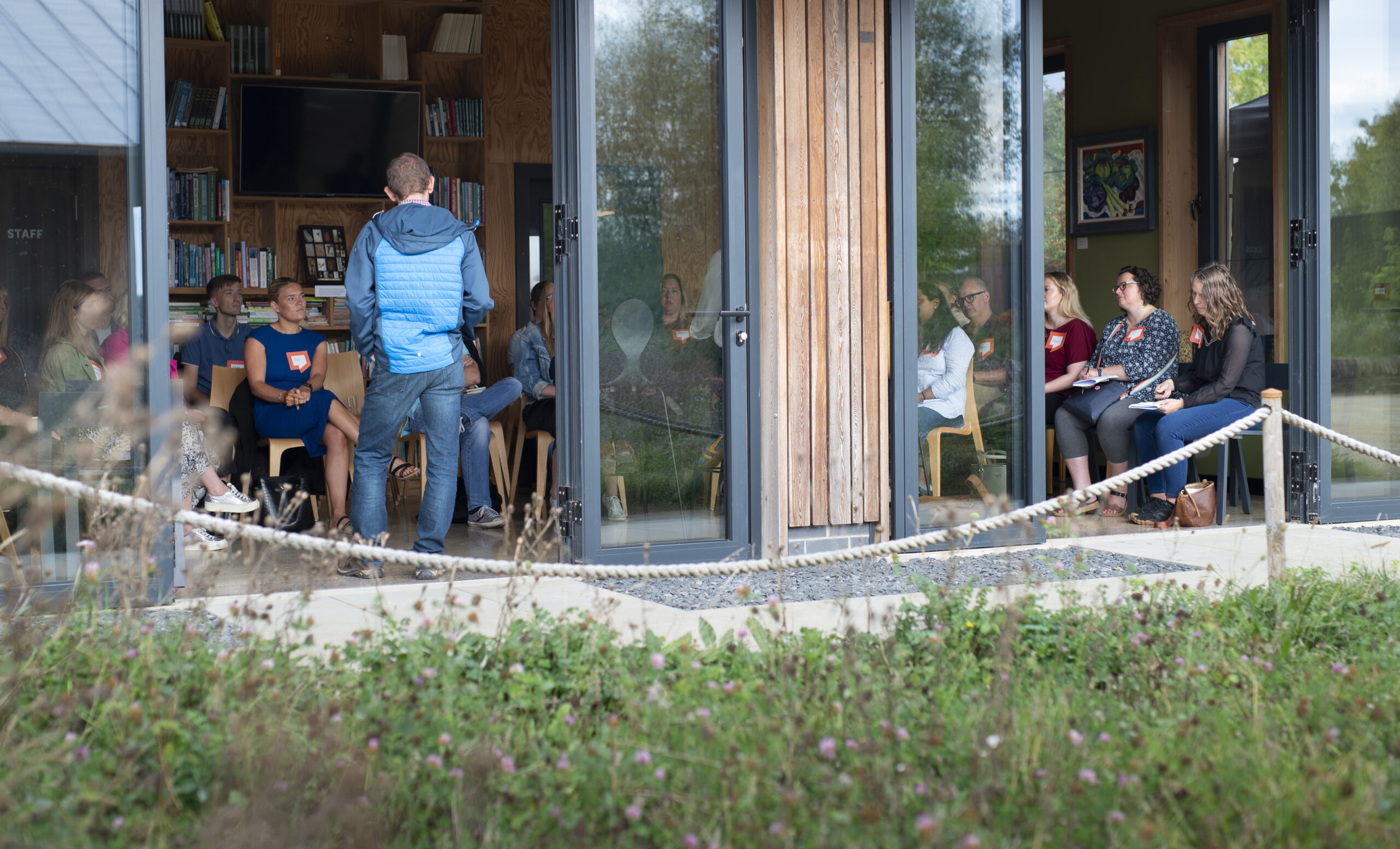

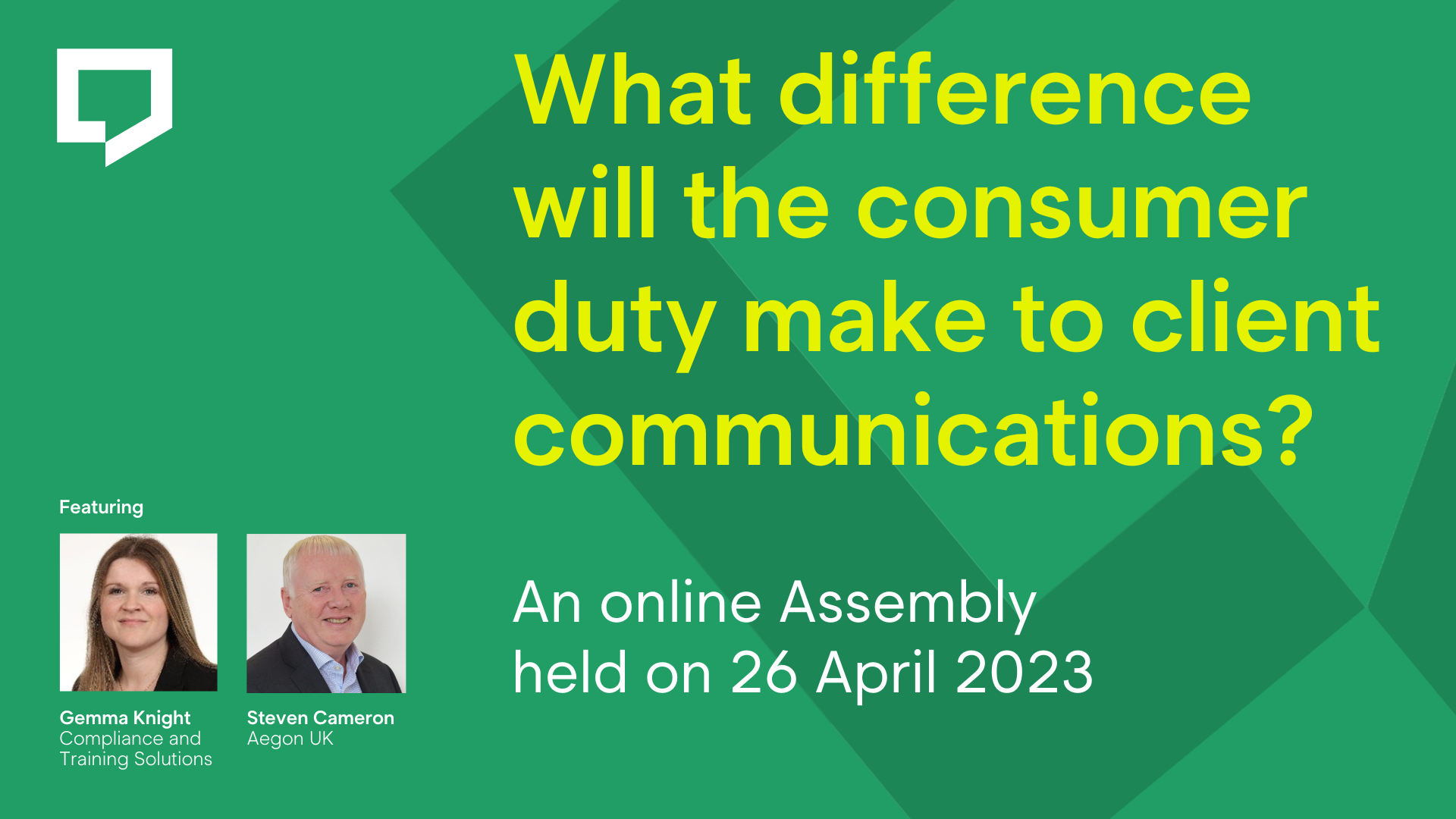
New consumer duty rules come into force on 31 July (for new products and services, that is).
Yet as recently as last month, Citywire reported that 59% of advisers have not started preparing for the July deadline – that’s according to a survey of 1,000 advice firms commissioned by Aviva.
It got us wondering: what’s going on in advice practices across the UK?
Are firms comfortable with the deadline because they’re confident they’ve got all the consumer duty bases covered?
Or could they be underestimating the effect the consumer duty rules will have on how we all communicate with clients?
What’s happening where you work? And with client communications at the heart of the Duty – and the role of paraplanners – should we be worried?
To explore what’s going on, we invited Aegon UK’s public affairs director, Steven Cameron, and Gemma Knight, a director of Compliance and Training Solutions (CATS), to join us online for a lunch-hour Assembly.
Is your firm ready for the 31 July deadline?
Watch the replay or listen to the podcast to find out!
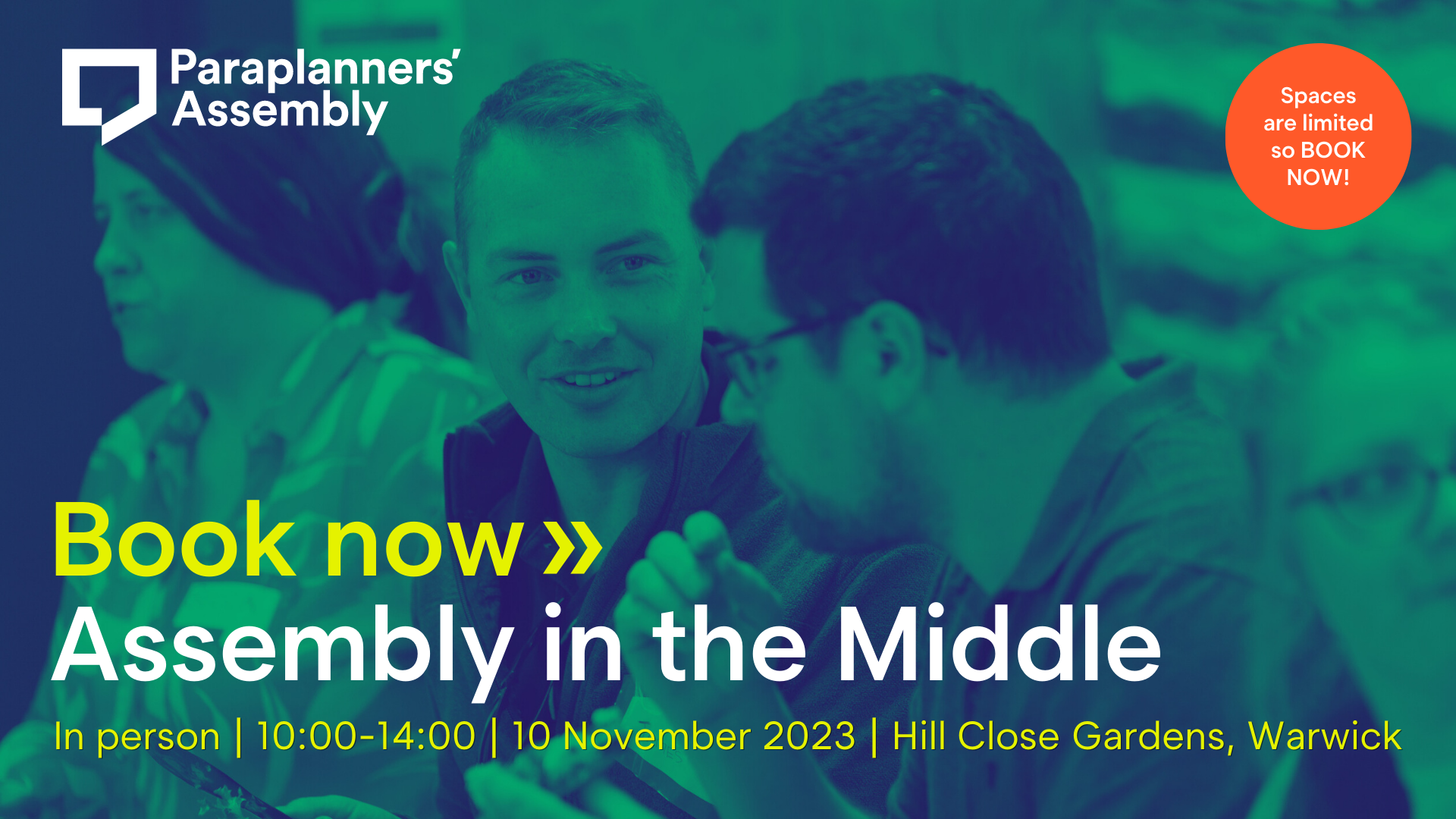
More than four years since it last gathered in person, Assembly in the Middle is back!
So if you’re a paraplanner who lives or works in the midlands of England, why not join organisers Caroline Stuart and Sam Tonks for an informal gathering at Hill Close Gardens in Warwick on 10 November 2023?
Assembly in the Middle will begin at 10am and finish at 2pm. But what happens in between is entirely up to you because, once you’ve booked your spot, we’ll invite you to submit ideas about what you’d like to learn, fix or share with other paraplanners on the day.
Why should I take part?
Because it’s part of the Paraplanners’ Assembly movement, Assembly in the Middle offers a supportive and encouraging space in which you can listen and learn, and share ideas, knowledge and insights.
And whether you’re in-house or outsourced, it’s a great way to meet other paraplanners from your neck of the woods – especially welcome when so many of us work from home these days.
It’s somewhere you can really focus and flourish – both professionally and personally.
Don’t forget to bring your lunch.
We’ll have coffee and tea and biscuits available throughout the day (plus chocolates, of course) but make sure you bring your own lunch or you’ll go hungry at lunchtime.
And finally…
You’ll feel you belong at an Assembly in the Middle because the Assembly in the Middle belongs to you.
Want to take part? Then tap ‘Book now’.

